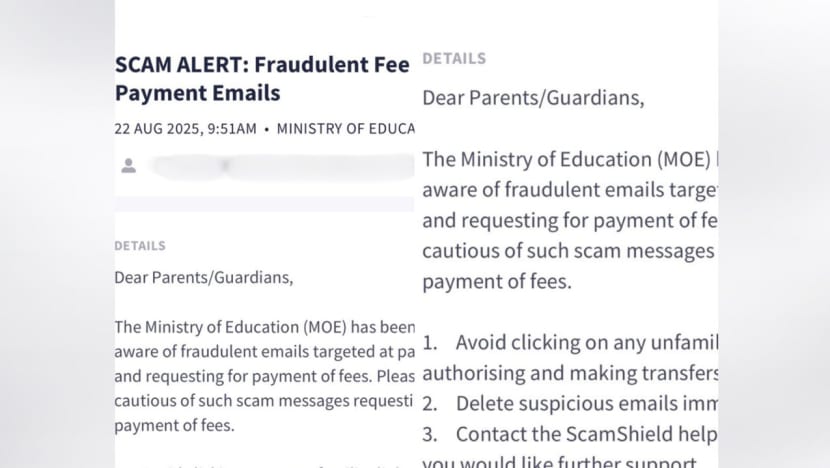MOE warns of scam targeting students with fake tuition payment emails
A police report has been made and investigations are ongoing.

Screenshots of an alert sent to parents by the Ministry of Education on Aug 22, 2025, about fraudulent emails targeting parents. (Images: CNA reader)

This audio is generated by an AI tool.
SINGAPORE: The Ministry of Education (MOE) on Friday (Aug 22) warned of scam emails targeting students at institutes of higher learning (IHL), prompting them to make payments for supposedly outstanding tuition fees.
"A police report has been made, and investigations are ongoing. The IHLs have alerted students and parents to warn them about this scam."
MOE also sent a message to all parents and guardians on Friday morning via Parents Gateway, a platform that supports parents and schools on key administrative matters.
The ministry said it had been made aware of fraudulent emails targeting parents and asking for the payment of fees.
"Those who have transferred money or provided personal information are advised to file a police report and notify their bank immediately," an MOE spokesperson said in response to queries from CNA.
It advised students and parents to exercise caution when receiving emails requesting direct payment, immediate bank transfers or providing payment links outside official student portals.
"When in doubt, students should verify directly with their institution or call the 24/7 ScamShield Helpline at 1799 to check."
OVER A DOZEN CASES SINCE AUGUST
Police said on Saturday that at least 16 cases have been reported since August, with total losses of no less than S$38,000 (US$29,655).
They noted that scammers would use compromised school email accounts to ask victims for urgent and prompt payment of school or tuition fees
"Victims would be asked to make payment to a bank account number listed in the email and warned that failure to do so would lead to legal consequences," police said.
Those targeted would subsequently realise that they had been scammed after checking or receiving notifications from the schools, they added.
Members of the public are advised to check with the school or education institution via official channels before transferring any money; especially for unscheduled payment requests.
They should not use the clickable links or QR codes provided by unknown people to make payments or transfers, or to download applications, without first verifying their legitimacy.
Such methods may lead to fake bank websites that phish for banking credentials or malicious software, police added.














